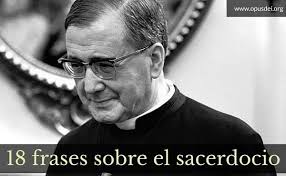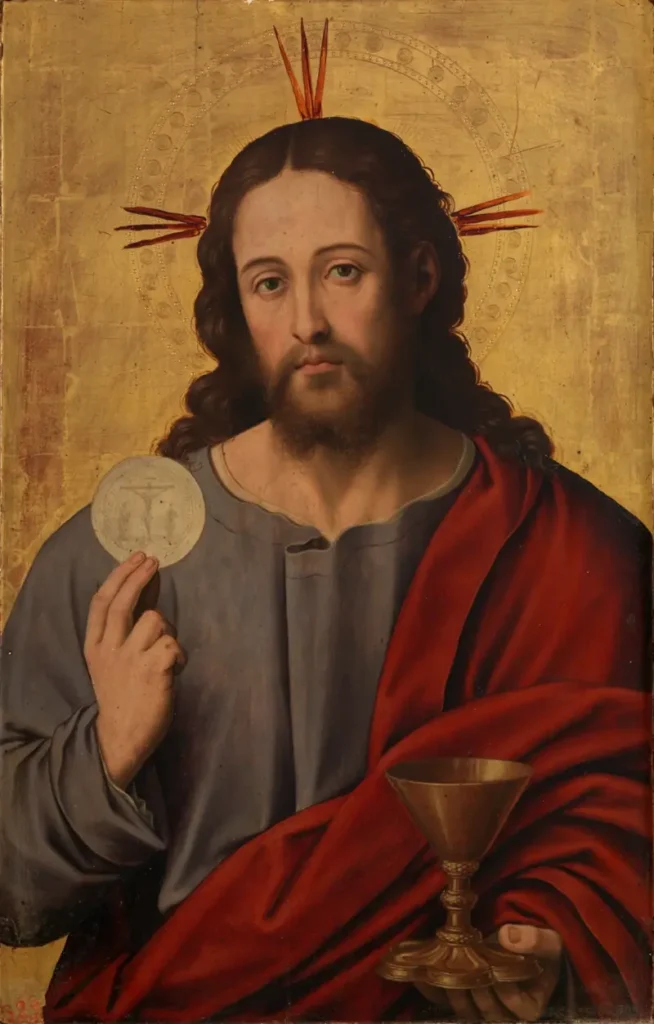
Each year, the Thursday after Pentecostthe Church celebrates a singular liturgical feast: the feast of Jesus Christ, High and Eternal Priest. It is not just another liturgical remembrance, but a profound invitation to contemplate the very heart of the Christian mystery: Christ who offers himself to the Father for the salvation of the worldand which associates the priests of the Church with this sacrifice.
This feast is centered on Christ in his priestly dimensioni.e., as mediator between God and mankind (cf. 1 Tim 2:5). He does not celebrate a particular moment of his life (such as Christmas or Easter), but rather his eternal priestly beingaccording to the order of Melchizedek (cf. Heb 5:6).
Jesus was not a priest like those of the Jewish temple. He is the perfect priest because it offered not animal sacrifices, but their own body and blood in obedience and love to the Father. As the Letter to the Hebrews says: "Christ came as High Priest of the good things to come... not by the blood of goats and calves, but by his own blood he entered once for all into the sanctuary and obtained eternal redemption" (Heb 9:11-12).
This feast was established in the liturgical calendar by some bishops -especially in Spain and Latin America- in the 20th century, and was approved by the Congregation for Divine Worship in 1987. Since then, it has been adopted by many dioceses around the world.

The Church teaches that Christ is at the same time priest, victim and altar. He is not only the one who offers, but also the one who the one who deliversChrist, the eternal priest, by the oblation of his body, accomplished once for all, brought to completion the work of human redemption" (Preface proper to the Mass of this feast).
At the Last Supper, he sacramentally anticipated the sacrifice he would consummate on the cross. Since then, each Mass is a real and sacramental actualization of this unique sacrifice.. It is not repeated, but is made present, by the power of the Holy Spirit.
Therefore, when priests celebrate the Eucharist, act "in persona Christi Capitis". (in the person of Christ the Head), not as mere delegates or representatives. It is Christ himself who acts through them.
This festival is also a privileged occasion to praying for priests. They have been configured with Christ the Priest to continue his mission. In the words of St. John Paul II: "The ministerial priesthood shares in the unique priesthood of Christ and has the task of making present in every age the sacrifice of redemption" (Letter to Priests, Holy Thursday 1986).
Today more than ever, priests need our closeness, our affection and our prayers. Their mission is beautiful, but also demanding. They are instruments of Christ's love, but they are not exempt from difficulties, fatigue and temptations.
This festival, therefore, is also a call to renew our love and support for our pastors. It is also a day for calling for new priestly vocations. The Church needs men who, in love with Christ, are ready to spend their lives in the service of the Gospel.
To contemplate Christ as High and Eternal Priest is to contemplate his Heart, his surrender, his obedience to the Father and his compassion for mankind. He became a priest in order to intercede for us without ceasingAs Hebrews says: "He is able to save those who draw near to God through him, since he always lives to make intercession for them" (Heb 7:25).
In a world marked by self-sufficiency, haste, and superficiality, looking to Christ the Priest is a call to live a spirituality of dedication, intercession and silent service. Christ does not impose himself: he offers himself. He does not demand: he gives himself. He does not exhibit Himself: He gives Himself to the extreme.
For the lay faithful, this feast is also a reminder that all the baptized share in Christ's priesthood. St. Peter says it clearly: "You are a chosen race, a royal priesthood, a holy nation, a people for God's own possession" (1 Pet 2:9).
This common priesthood of the faithful is lived in daily offering, in prayer, in charity, in the witness of life. Every Christian is called to offer his life as a spiritual sacrifice pleasing to God (cf. Rom 12:1).

The Feast of Jesus Christ, High and Eternal Priest, invites us to look at the altar with renewed faithand to recognize that Christ himself is at work there. It reminds us that salvation does not come from our works, but from Christ's sacrifice.. And that this sacrifice is eternal, always living, always effective.
It is a profoundly Eucharistic, profoundly priestly and profoundly ecclesial feast. It is an opportunity to thank Christ for his self-giving, to pray for those who have been called to represent him sacramentally, and to offer ourselves with him to the Father for the good of the world.
1. What is the identity of the priest? That of Christ. All Christians can and should be not only priests, but also priests. alter Christus but ipse Christus, other Christs, Christ himself! But in the priest this is given immediately, in a sacramental way. (Loving the Church, 38).
2. We priests are asked to have the humility to learn to be unfashionable, to be truly servants of the servants of God (...), so that ordinary Christians, the laity, may make Christ present in all areas of society. (Conversations, 59).
A priest who lives the Holy Mass in this way - adoring, atoning, impetrating, giving thanks, identifying himself with Christ - and who teaches others to make the Sacrifice of the Altar the center and root of the Christian's life, will truly demonstrate the incomparable greatness of his vocation, that character with which he is sealed, which he will not lose for all eternity (Loving the Church, 49). (Loving the Church, 49).
4. I have always conceived my work as a priest and pastor of souls as a task aimed at placing each one before the full demands of his life, helping him to discover what God, in concrete terms, is asking of him, without placing any limitation on that holy independence and that blessed individual responsibility which are characteristic of a Christian conscience. (It is Christ that passes, 99).
5. The value of piety in the Holy Liturgy!
I was not at all surprised by what someone told me a few days ago about an exemplary priest who died recently: what a saint he was!
-Did you treat him a lot," I asked.
-No," he replied, "but I saw him celebrate Mass once. (Forge, 645).
6. I do not want -as I am aware- to fail to remind you again that the Priest is "another Christ". -And that the Holy Spirit has said: "nolite tangere Christos meos". -do not want to touch "my Christs". (Road, 67).
7. The professional work, so to speak, of priests is a divine and public ministry, which demands the whole activity to such an extent that, in general, if a priest has time left over for other work that is not properly priestly, he can be sure that he is not fulfilling the duties of his ministry. (Friends of God, 265).
8. Christ, who ascended the Cross with his arms wide open, with the gesture of an Eternal Priest, wants to count on us, who are nothing, to bring to "all" men the fruits of his Redemption. (Forge, 4).
9. Neither to the right nor to the left, nor to the center. I, as a priest, try to be with Christ, who on the Cross opened both arms and not only one of them: I freely take from each group that which convinces me and makes me have a welcoming heart and arms for all humanity. (Conversations, 44).
10. That priest friend worked thinking of God, holding on to his paternal hand, and helping others to assimilate these mother ideas. That is why he used to say to himself: when you die, everything will be all right, because He will continue to take care of everything.(Furrow, 884).
11. That priest friend of ours convinced me. He spoke to me about his apostolic work, and assured me that there are no unimportant occupations. Beneath this field of roses," he said, "is hidden the silent effort of so many souls who, with their work and prayer, with their prayer and work, have obtained from Heaven a torrent of rains of grace that makes everything fruitful. (Furrow, 530).
12. Live the Holy Mass!
-It will help you to consider the thought of a priest in love: "Is it possible, my God, to participate in Holy Mass and not be a saint?
-And he continued: "I will stay every day, fulfilling an ancient purpose, in the Sore of my Lord's Side!
-Cheer up! (Forge, 934).
To be a Christian - and in a particular way to be a priest, remembering also that all the baptized participate in the royal priesthood - is to be continually at the Cross (Forge, 882). (Forge, 882).
14. Let us not become accustomed to the miracles that take place before us: to this marvelous wonder that the Lord descends every day into the hands of the priest. Jesus wants us to be awake, so that we may be convinced of the greatness of his power, and so that we may hear his promise anew: venite post me, et faciam vos fieri piscatores hominumIf you follow me, I will make you fishers of men; you will be effective, and you will draw souls to God. We must trust, therefore, in these words of the Lord: get into the boat, take up the oars, hoist the sails, and launch out into the sea of the world that Christ gives us as our inheritance. (It is Christ who passes by, 159).
If it is true that we drag personal miseries, it is also true that the Lord counts on our mistakes. It does not escape his merciful gaze that we men are creatures with limitations, with weaknesses, with imperfections, inclined to sin. But he commands us to struggle, to recognize our defects; not to be cowed, but to repent and to foster the desire to be better. (It is Christ who passes by, 159).
15. Priest, my brother, always speak of God, for if you are his, there will be no monotony in your conversations. (Forge, 965).
16. The guardianship of the heart. -Thus prayed that priest: "Jesus, may my poor heart be a sealed garden; may my poor heart be a paradise, where You live; may the Angel of my Guardian guard it, with a sword of fire, with which He purifies all the affections before they enter me; Jesus, with the divine seal of your Cross, seal my poor heart". (Forge, 412).
17. When he gave Holy Communion, that priest felt like shouting: "Here I give you Happiness! (Forge, 267)
18. In order not to scandalize, in order not to produce even the shadow of suspicion that the children of God are lazy or useless, in order not to be a cause of disedification..., you must strive to offer with your conduct the just measure, the good disposition of a responsible man.... (Friends of God, 70).